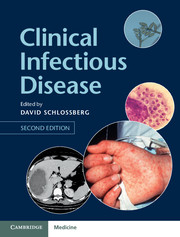Book contents
- Frontmatter
- Dedication
- Contents
- List of Contributors
- Preface
- Part I Clinical syndromes: general
- Part II Clinical syndromes: head and neck
- Part III Clinical syndromes: eye
- Part IV Clinical syndromes: skin and lymph nodes
- Part V Clinical syndromes: respiratory tract
- Part VI Clinical syndromes: heart and blood vessels
- Part VII Clinical syndromes: gastrointestinal tract, liver, and abdomen
- Part VIII Clinical syndromes: genitourinary tract
- 59 Urethritis and dysuria
- 60 Vaginitis and cervicitis
- 61 Epididymo-orchitis
- 62 Genital ulcer adenopathy syndrome
- 63 Prostatitis
- 64 Pelvic inflammatory disease
- 65 Urinary tract infection
- 66 Candiduria
- 67 Focal renal infections and papillary necrosis
- Part IX Clinical syndromes: musculoskeletal system
- Part X Clinical syndromes: neurologic system
- Part XI The susceptible host
- Part XII HIV
- Part XIII Nosocomial infection
- Part XIV Infections related to surgery and trauma
- Part XV Prevention of infection
- Part XVI Travel and recreation
- Part XVII Bioterrorism
- Part XVIII Specific organisms: bacteria
- Part XIX Specific organisms: spirochetes
- Part XX Specific organisms: Mycoplasma and Chlamydia
- Part XXI Specific organisms: Rickettsia, Ehrlichia, and Anaplasma
- Part XXII Specific organisms: fungi
- Part XXIII Specific organisms: viruses
- Part XXIV Specific organisms: parasites
- Part XXV Antimicrobial therapy: general considerations
- Index
- References
63 - Prostatitis
from Part VIII - Clinical syndromes: genitourinary tract
Published online by Cambridge University Press: 05 April 2015
- Frontmatter
- Dedication
- Contents
- List of Contributors
- Preface
- Part I Clinical syndromes: general
- Part II Clinical syndromes: head and neck
- Part III Clinical syndromes: eye
- Part IV Clinical syndromes: skin and lymph nodes
- Part V Clinical syndromes: respiratory tract
- Part VI Clinical syndromes: heart and blood vessels
- Part VII Clinical syndromes: gastrointestinal tract, liver, and abdomen
- Part VIII Clinical syndromes: genitourinary tract
- 59 Urethritis and dysuria
- 60 Vaginitis and cervicitis
- 61 Epididymo-orchitis
- 62 Genital ulcer adenopathy syndrome
- 63 Prostatitis
- 64 Pelvic inflammatory disease
- 65 Urinary tract infection
- 66 Candiduria
- 67 Focal renal infections and papillary necrosis
- Part IX Clinical syndromes: musculoskeletal system
- Part X Clinical syndromes: neurologic system
- Part XI The susceptible host
- Part XII HIV
- Part XIII Nosocomial infection
- Part XIV Infections related to surgery and trauma
- Part XV Prevention of infection
- Part XVI Travel and recreation
- Part XVII Bioterrorism
- Part XVIII Specific organisms: bacteria
- Part XIX Specific organisms: spirochetes
- Part XX Specific organisms: Mycoplasma and Chlamydia
- Part XXI Specific organisms: Rickettsia, Ehrlichia, and Anaplasma
- Part XXII Specific organisms: fungi
- Part XXIII Specific organisms: viruses
- Part XXIV Specific organisms: parasites
- Part XXV Antimicrobial therapy: general considerations
- Index
- References
Summary
Prostatitis and pelvic pain syndromes in men are a common clinical problem and can be due to infectious or noninfectious etiologies. It is estimated that nearly 9% of the male population suffer from prostatitis and pelvic pain symptoms, and that there are >2 million annual physician visits for prostatitis. Over half of patients presenting with prostatic symptoms get treated with antibiotics at some time.
In acute prostatitis, the acute inflammatory response often involves most if not all of the gland, whereas chronic prostatitis is often focal. Noninfectious pathology may be cofactors. For example, prostatic concretions may be a nidus for infection, and focal prostatic necrosis (benign prostatic hyperplasia) may cause prostatic inflammation, even without infection.
The majority of bacterial prostatitis cases occur due to reflux of infected urine into the prostatic ducts and canaliculi, and these cases are seen most commonly in older men, usually associated with other structural or functional abnormalities of the genitourinary tract. Bacterial prostatitis is more common in patients with previous prostate disease, diabetes mellitus, and a history of urethral instrumentation (such as catheterization).
Since urethritis is the initial symptom of gonococcal and chlamydial infection, patients seek care early, and with the widespread availability of effective treatments, the infections are eradicated. Nevertheless, sexually transmitted diseases (STDs), especially chlamydia, have been increasing implicated in a small proportion of cases, usually men < 35 years old. STD-associated chronic prostatitis is rare. Prostatitis due to hematogenously disseminated organisms is unusual and is seen either in immunocompromised hosts or malignancy, and can be caused by Mycobacterium tuberculosis, Cryptococcus neoformans, Coccidioides immitis, Histoplasma capsulatum Aspergillus spp. and Candida.
- Type
- Chapter
- Information
- Clinical Infectious Disease , pp. 413 - 417Publisher: Cambridge University PressPrint publication year: 2015

